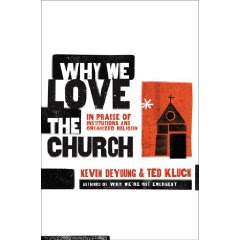
Ted Kluck and I have a new book coming out July 1. It’s called Why We Love the Church: In Praise of Institutions and Organized Religion. In my first chapter I try to explain why Christians are fed up with church.
*****
There are plenty of reasons people offer for their disillusionment with the church. These reasons can be grouped into four categories:
The Missiological. Many Christians feel like the church just doesn’t work any more. They are just sick and tired of the church’s failings and impotency. They recognize that most churches are not growing. No one is getting baptized. Our young people aren’t sticking with the church after high school. We have simply lost our way. Related to this concern, but somewhat distinct, many Christians criticize the church for losing sight of its mission. There are a host of problems in society that we are ignoring. The church has turned a blind eye to the community around her and is making no impact on the world. Face it, many people say, the church tried and failed.
The Personal. Personal objections to the church are frequently voiced by both insiders and outsiders. The church, in the eyes of many outsiders, especially the young, is filled with hypocritical, anti-women, anti-gay, judgmental, close-minded, bubble-dwelling, acolytes for the Republican Party. “Christianity,” as one popular book puts it, “has an image problem.” And until we fix our image, the argument goes, more and more people will stay away from our churches and others will leave out of sheer embarrassment and frustration.
Many church insiders have an equally negative impression. They feel personally wounded or let down by the church. They find the church legalistic, oppressive, and hurtful. The leaders are controlling; the people are phony, and the ministry is programmed to death. The church is just another club, protecting their own and laying down a bunch of rules that only instill a sense of self-loathing and a fruitless desire to be good enough for God. Many in the church silently, or not so silently, feel like the Sunday services are a drag, the sermons are fluffy and uninspiring, and the music is pre-packaged. The whole thing is, for some, a big, repetitive, soul-shriveling show. Who needs it?
The Historical. According to some disgruntled Christians, the church as we know is an unbiblical, historical accident at best and a capitulation to paganism at worst. All that we think of as “church”—sermons, buildings, pastors, liturgy, offerings, choirs, and just about anything you else you want to mention—are the result of the church falling from its pristine state in the first century into the syncretistic, over-institutionalized religion that now passes for Christianity. Whether this fall from grace came in the second century after the last Apostle died, or in the first few centuries where Greek thinking overtook Hebraic thinking in the church, or in the fourth century with Constantine and all the accompanying evils of Christendom, the fact remains the same: the church as we know it in the West has been corrupted beyond recognition. And on top of this, we have the record of atrocities committed by the church over the centuries. Surely history demonstrates that the church has, for the most part, been an embarrassing failure. Let’s say we’re sorry and move on to some other way of building the kingdom.
The Theological. Most serious of all these important concerns are the biblical and theological critiques leveled against the church. Most Christians will acknowledge that “church” is an important New Testament concept and that Jesus loves the church and shed his blood for it. But for many, “church” is just plural for Christian. All you need for church is two or three people who worship Christ to be together in the same place. To be a part of a church means nothing more than that we love Jesus and love other people. The organizational, institutional, hierarchical, programmatic, weekly services view of church, it is said, is completely foreign to the Bible. Jesus came to put an end to religion, not to start a new one. He came to bring the kingdom, not our little empires we call churches. The more we can move away from all the man-made doctrines, rituals, and structures of church as we know it, the closer we will be to truly knowing God in all his unconditional, untamed, mysterious, relational love.
*****
Now that we know the problems, over the next couple months, I’ll occasionally post excerpts from the book and give you a taste for how we respond to these objections.



